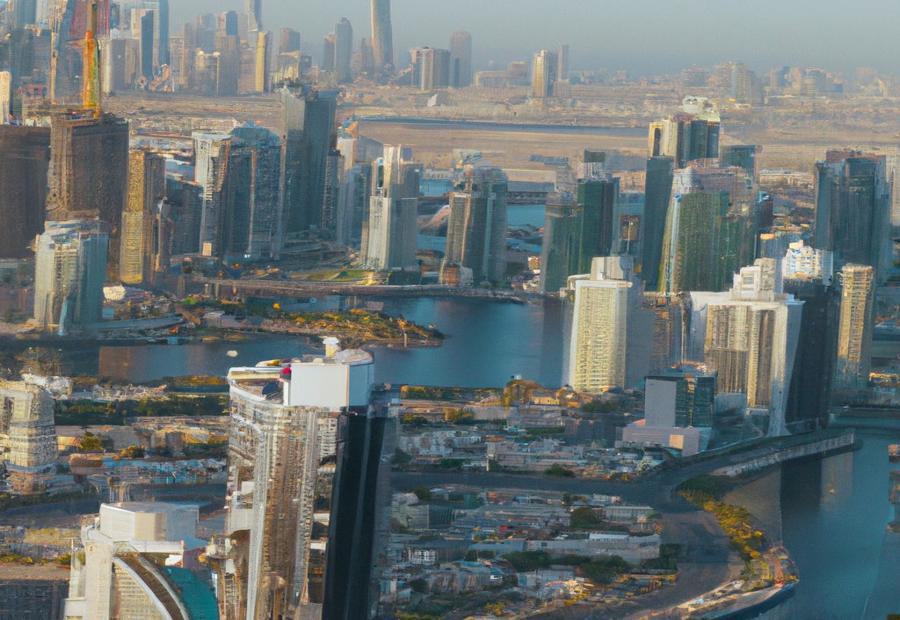- July 28, 2023
- Posted by: DBS
- Category: Uncategorized

Tax benefits play a crucial role in the economic growth and development of businesses. Dubai, as a global business hub, offers attractive tax incentives and advantages to promote entrepreneurship and attract foreign investment. In this article, we will explore the various tax benefits available for businesses in Dubai and how they contribute to the city’s thriving business environment.
Dubai operates in a tax-free environment, meaning that businesses in the city are exempt from several types of taxes. This includes corporate tax, personal income tax, value-added tax (VAT), and customs duty. The absence of these taxes provides significant financial advantages for businesses, allowing them to retain more of their profits and reinvest in growth and expansion.
Dubai offers other tax benefits that further enhance its appeal to businesses. Double taxation avoidance agreements, for example, ensure that businesses operating in Dubai are not subject to tax on the same income in multiple jurisdictions. The tax residency certificate allows eligible businesses and individuals to take advantage of the network of double taxation avoidance agreements signed by the UAE. Free trade zones in Dubai provide businesses with a range of incentives, including tax exemptions, 100% foreign ownership, and customs duty benefits. These zones are designed to attract specific industries and facilitate international trade.
To avail the tax benefits in Dubai, businesses must fulfill certain requirements and meet eligibility criteria. These include company formation and registration, compliance with economic substance regulations, and adherence to specific guidelines for each type of tax benefit.
Tax-Free Environment in Dubai

Dubai offers a lucrative opportunity with its tax-free environment to businesses, making it an exceedingly attractive destination for entrepreneurs. In this tax-free environment, businesses can operate without the obligation of paying any corporate or personal income taxes, capital gains tax, or withholding tax. This unparalleled advantage empowers companies to fully retain their profits and reinvest in their exponential growth. Not to mention, there are no property taxes, facilitating businesses in acquiring or leasing properties effortlessly. The exceptional tax-free environment in Dubai plays a pivotal role in fueling the city’s thriving economy and cultivating a climate of immense foreign investments. By eliminating the burden of heavy taxation, businesses are able to flourish and expand exponentially. Undoubtedly, this absence of taxes fosters an ideal business climate, attracting both local and international enterprises to establish their presence in Dubai. It is this tax-free environment that forms the cornerstone of Dubai’s stellar reputation as a global business hub and an unrivaled gateway to the Middle East.
What does it mean to operate in a tax-free environment?
Operating in a tax-free environment means that businesses in Dubai are not required to pay certain types of taxes. This includes corporate tax, personal income tax, value-added tax, and customs duty. The absence of these taxes allows businesses to retain more of their profits and reinvest them into their operations.
In addition to the absence of taxes, operating in a tax-free environment also provides other benefits for businesses. These include opportunities for duty-free import/export, access to free trade zones, and the ability to take advantage of double taxation avoidance agreements. These benefits make Dubai a highly attractive location for businesses looking to expand internationally.
To operate in a tax-free environment in Dubai, businesses need to fulfill certain requirements and eligibility criteria. This includes company formation and registration, as well as compliance with economic substance regulations. By meeting these obligations, businesses can fully enjoy the tax benefits offered in Dubai.
Types of Taxes Not Applicable to Businesses in Dubai

Dubai is renowned for its favorable tax environment, offering numerous benefits to businesses. In this section, we’ll uncover the types of taxes that businesses in Dubai are exempt from. From corporate tax to personal income tax, value-added tax to customs duty, we’ll navigate through the unique tax landscape that sets Dubai apart as a business-friendly destination. Get ready to discover the tax advantages that await entrepreneurs and investors in this thriving global hub.
Corporate Tax
Corporate tax is not applicable to businesses in Dubai.
This means that companies operating in Dubai are not required to pay corporate tax on their profits.
The absence of corporate tax in Dubai is a significant advantage for businesses, as it allows them to retain more of their earnings and reinvest them into their growth and development.
This tax benefit enhances the overall profitability and competitiveness of businesses in Dubai.
Without the burden of corporate tax, companies can allocate more resources towards expanding their operations, hiring additional employees, and implementing strategies to boost their market presence.
This favorable tax environment has attracted numerous businesses to establish their presence in Dubai and has contributed to the city’s reputation as a thriving business hub.
As a result, Dubai has witnessed rapid economic growth and has become a preferred destination for both local and international companies seeking tax advantages.
Personal Income Tax
Personal income tax is one of the types of taxes that is not applicable to businesses in Dubai. In a tax-free environment, businesses in Dubai do not have to pay personal income tax on their earnings. This means that individuals who are employed by these businesses are not required to pay income tax on their salaries and wages. This tax benefit allows businesses in Dubai to attract and retain talented individuals by offering them the advantage of keeping their entire income without any deductions or taxes. This benefit not only boosts the financial well-being of employees but also enhances their overall job satisfaction and motivation. Businesses can cultivate a proficient workforce by providing this tax benefit, as employees have more disposable income to invest in their personal and professional growth. Additionally, businesses can allocate resources towards other areas such as employee training, infrastructure development, and business expansion instead of setting aside funds for personal income tax payments.
Value Added Tax
(VAT) is not applicable to businesses in Dubai. This means that businesses in Dubai are not required to charge Value Added Tax on the goods or services they provide. Unlike many other countries, Dubai exempts businesses from the burden of paying and collecting VAT. This can greatly benefit businesses as it reduces their operating costs and increases their competitiveness in the market. Without the added expense of Value Added Tax, businesses can offer more competitive prices to their customers, attracting more sales and boosting their revenue. Additionally, not having to deal with Value Added Tax also simplifies the accounting and administrative processes for businesses.
The absence of Value Added Tax in Dubai allows businesses to have a significant advantage over their competitors in other countries where VAT is applicable. It creates a tax-efficient environment that fosters business growth and encourages foreign investment. This tax benefit further enhances Dubai’s reputation as a business-friendly and tax-friendly destination. Businesses can prioritize allocating their resources towards expansion, innovation, and development, rather than tax compliance. By eliminating the burden of Value Added Tax, Dubai offers businesses a unique advantage that contributes to their success and profitability.
Customs Duty
Customs Duty is an important aspect of the tax benefits for businesses in Dubai. This specific tax is not applicable to businesses operating in the region.
The table below provides an overview of the Customs Duty exemption for businesses in Dubai:
| Tax | Applicability in Dubai |
| Customs Duty | Not applicable |
Dubai offers a tax-friendly environment to promote business growth and attract investments. By exempting businesses from Customs Duty, Dubai encourages international trade and the import-export industry. This allows businesses to import goods without incurring additional expenses in the form of customs taxes.
Dubai’s Customs Duty exemption creates a competitive advantage for businesses, increasing their profitability and reducing operational costs. It fosters an attractive business environment, attracting companies from different sectors to establish a presence in Dubai.
Over the years, Dubai has built a reputation as a global trading hub due to its tax benefits and strategic location. Businesses can efficiently import and export goods to and from Dubai without the burden of Customs Duty.
Other Tax Benefits for Businesses in Dubai
With a business-friendly ecosystem, Dubai offers a myriad of tax benefits that entice entrepreneurs. In this section, we’ll dive into some other tax advantages that businesses in Dubai can reap. We’ll explore topics such as Double Taxation Avoidance Agreements, Tax Residency Certificates, the perks of operating in Free Trade Zones, and the enticing opportunities for duty-free import/export. Get ready to unlock key insights on how Dubai fosters a tax-friendly environment to boost business growth.
Double Taxation Avoidance Agreements
Double taxation avoidance agreements, also known as DTAs, play a crucial role in providing tax benefits for businesses in Dubai. These bilateral agreements between two countries are designed to prevent the same income from being taxed twice. Dubai has signed numerous DTAs with countries worldwide, promoting international trade and investment.
Through these agreements, businesses in Dubai can benefit from avoiding taxation on the same income in both Dubai and the country where it is generated. This advantage significantly helps businesses operating globally by eliminating the costly burden of double taxation.
By leveraging the advantages of double taxation avoidance agreements, businesses in Dubai can expand their operations, increase profitability, and strengthen their international presence. These agreements offer certainty and stability for businesses, enabling effective planning and resource allocation. With reduced tax burdens, businesses can reinvest their earnings, stimulate economic growth, and foster innovation.
It is crucial for businesses to have awareness of the specific provisions and requirements outlined in these agreements to fully capitalize on the benefits they offer. Seeking professional advice and understanding the intricacies of each DTA is essential to optimize tax benefits and ensure compliance.
Tax Residency Certificate
A tax residency certificate is a document issued by the tax authorities in Dubai that confirms an individual’s tax residency status in the country. This tax residency certificate is crucial for businesses in Dubai as it enables them to take full advantage of the tax benefits and incentives offered by the government.
To obtain a tax residency certificate, individuals must fulfill specific requirements and meet eligibility criteria set by the tax authorities. These requirements may include demonstrating a certain level of business activity in Dubai, maintaining a physical presence, or meeting specific financial thresholds.
Having a tax residency certificate empowers businesses to enjoy various tax benefits, such as exemption from withholding taxes on foreign dividends, capital gains, and interest income. Additionally, it provides businesses with access to double taxation avoidance agreements, which assist in minimizing the tax burden on international transactions.
Moreover, the tax residency certificate contributes to the overall ease of doing business in Dubai, enhancing the country’s reputation as a business-friendly destination.
Historically, Dubai has been dedicated to attracting foreign businesses by offering appealing tax incentives. The introduction and availability of the tax residency certificate further bolster its position as a global business hub, fostering economic growth and attracting investments from around the world.
Free Trade Zones
The free trade zones in Dubai offer numerous benefits for businesses looking to establish a presence in the region. Here are some key advantages:
- Tax incentives: Free trade zones provide businesses with a tax-free environment, meaning they are exempt from corporate tax, personal income tax, value-added tax, and customs duty. This helps companies save significantly on their operational costs.
- 100% foreign ownership: Companies in Dubai’s free trade zones can be fully owned by foreign nationals or entities. This allows for complete control and autonomy over business operations.
- Simplified procedures: Setting up a business in free trade zones is relatively fast and straightforward. The government has implemented streamlined processes and reduced bureaucratic hurdles, making it easier for entrepreneurs to establish and operate their ventures.
- Infrastructure and facilities: Free trade zones offer state-of-the-art infrastructure, modern office spaces, warehousing facilities, and access to advanced logistics services. This provides businesses with a conducive environment to grow and expand.
- Networking opportunities: Free trade zones are home to a diverse range of businesses from various industries. This fosters an atmosphere of collaboration and networking, allowing companies to connect with potential partners, suppliers, and customers.
Duty-Free Import/Export
| Benefits | Description |
| Tariff Exemption | Duty-free import/export means that businesses in Dubai can bring goods into the country or export them without having to pay any import or export taxes. |
| Cost Savings | By not having to pay import or export duties, businesses can save a significant amount of money on their international trade activities. |
| Increased Competitiveness | Being able to import or export goods without additional costs gives businesses in Dubai a competitive edge in the global market. |
| Trade Facilitation | Duty-free import/export simplifies and expedites the movement of goods across borders, reducing administrative burdens and facilitating trade. |
A clothing retailer in Dubai was able to take advantage of duty-free import/export to bring in a large shipment of clothing from a manufacturing hub in Asia. By not having to pay any import duties, the retailer was able to offer the clothing at a competitive price in the local market, attracting more customers and increasing sales. The duty-free import/export benefit allowed the retailer to save on costs and pass those savings on to customers, boosting both their profitability and customer satisfaction. It also facilitated smooth and efficient trade, enabling the retailer to establish strong relationships with international suppliers and expand their product offering.
Requirements and Eligibility for Tax Benefits in Dubai
Dubai is known for its enticing tax benefits that businesses can enjoy. In this section, we’ll focus on the requirements and eligibility criteria for availing these advantages. We’ll dig into the process of company formation and registration, shedding light on the key factors to consider. Additionally, we’ll explore the importance of complying with the Economic Substance Regulations, ensuring businesses adhere to the necessary guidelines. Get ready to uncover the opportunities and prerequisites for accessing tax benefits in Dubai.
Company Formation and Registration
When it comes to company formation and registration in Dubai, there are several essential steps that need to be followed:
- Choose the most suitable legal structure for your company, such as a Limited Liability Company (LLC), Free Zone Company, or Branch of a Foreign Company.
- Select a unique trade name for your company and ensure it complies with the UAE’s naming guidelines.
- Gather all the required documents for company formation, including copies of passports, relevant licenses, and a memorandum of association.
- Submit the completed application and necessary documents to the relevant authority, such as the Dubai Department of Economic Development (DED) or the respective Free Zone Authority.
- Ensure to pay the applicable registration fees for your company formation process.
- In order to conduct your business activity smoothly, obtain any additional approvals, permits, or licenses that are relevant to your industry or profession.
- It is important to open a corporate bank account in Dubai to handle your business transactions and manage your finances.
- Depending on the type of company, acquire a physical office space or desk within a business center to fulfill the requirements.
- If needed, apply for visas for the employees and partners of your company.
Compliance with Economic Substance Regulations
Compliance with Economic Substance Regulations is a crucial aspect for businesses in Dubai. These regulations aim to ensure that companies operating in the region have substantial economic activity and demonstrate a genuine presence. It is important for businesses to actively comply with these regulations to enjoy the tax benefits offered in Dubai.
Under the Economic Substance Regulations, companies are required to meet certain criteria to demonstrate economic substance in Dubai. They must engage in core income-generating activities, have an adequate number of qualified employees, and maintain adequate physical assets and expenditure in the region.
Failure to comply with these regulations can result in penalties, including financial penalties and the potential risk of losing tax benefits. Therefore, it is essential for businesses to understand and adhere to the guidelines set forth by the Economic Substance Regulations.
By ensuring compliance, businesses can take advantage of tax benefits such as the tax-free environment, exemption from corporate tax, personal income tax, value-added tax, and customs duty. Compliance with Economic Substance Regulations not only safeguards a company’s eligibility for these tax benefits but also promotes transparency and integrity in business operations.
Frequently Asked Questions
What are the tax benefits for businesses in Dubai?
Q: What is the corporate tax rate in Dubai?
A: Companies incorporated in Dubai are subject to a corporate tax rate of 9% for profits exceeding AED 375,000.
Q: Are free zone companies exempt from corporate tax in Dubai?
A: Yes, under certain conditions, free zone companies in Dubai are exempt from corporate tax.
Q: What is the maximum corporate tax rate for the oil and bank sectors in Dubai?
A: The oil sector in Dubai is subject to a maximum corporate tax rate of 55%, while branches of foreign banks must pay a 20% tax rate on their Dubai source income.
Q: What are the conditions for qualifying as a free zone entity with 0% corporate tax rate in Dubai?
A: Free zone entities in Dubai must maintain adequate substance in the UAE, comply with transfer pricing rules, and meet additional conditions to qualify for a 0% corporate tax rate on qualifying income.
Q: Are there any withholding taxes on remitted dividends and interests abroad for Dubai-based companies?
A: No, companies in Dubai are not subject to withholding taxes on remitted dividends and interests abroad.
Q: What are the indirect taxes applicable in Dubai?
A: In Dubai, there are indirect taxes such as a municipal tax of 10% on hotels and entertainment activities, a 50% tax on the import of alcoholic beverages, and a 30% tax on the purchase of alcohol.
